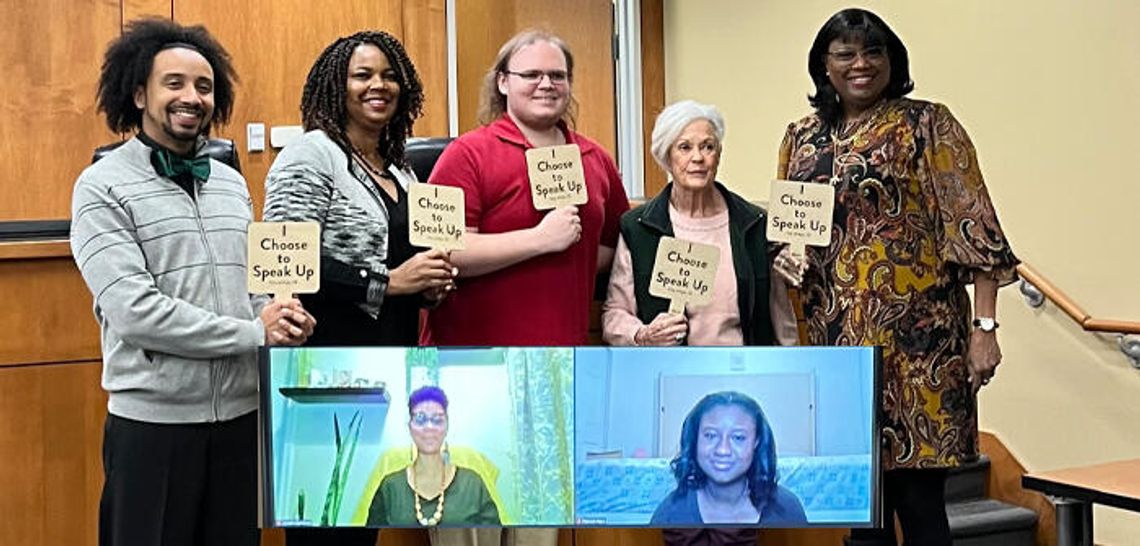By Brittany Anderson
Honest conversations that start in your own community help facilitate necessary social change — which is what Kyle’s Dialogue for Peace and Progress series aims to do for the city and its residents.
The fifth edition of the Peace and Progress series was held at Kyle City Hall on Feb. 18 in celebration of Black History Month. Spearheaded by Kyle councilman Dex Ellison, who serves as the panel’s moderator, the series provides an opportunity for community members and leaders to connect with each other through conversations about social issues that are “seldom talked about publicly.”
The in-person panel consisted of Genest Harding, Vanessa Westbrook, Sheila Henderson and Anthony Davis. Pastor Jonafa Banbury and Lehman High School student Naissa Bayo joined virtually.
As with every dialogue series, panelists had “I choose to speak” and “I choose to listen” paddles to indicate whether they would like to discuss the topic at hand or listen to other’s responses. Audience participation both in-person and virtually was also encouraged through an interactive app, giving them the ability to reflect on the topics alongside the panelists.
The Black History Month theme for 2022 is Black Health and Wellness. Mental health was at the forefront of the panelist’s conversations as they reflected on how the COVID-19 pandemic has affected people’s mental and physical well being, compounded by the fact that this is a “taboo subject” within the African American community.
Banbury said that spirituality and faith are connected to mental health, and while they are areas where the African community has practiced for generations and excelled in, there is still room for improvement — especially in making sure people have proper access to resources, something that Harding said she, as a healthcare worker, has seen reluctance from the community in seeking out.
The panel also spoke heavily about the importance of Black History Month, the controversy surrounding critical race theory and how communities can and should do better in adequately recognizing the contributions African Americans have made in the country.
“To this day, some of my peers don’t recognize the importance of Black people in this country, or it doesn’t seem that big of a deal because they just don’t know,” Bayo said. “Make it part of the actual curriculum. It will stick in some way and become part of their conscience.”
Westbrook shared that she often goes around to various schools and programs focusing on Black history and will dress up as Bessie Coleman, the first African American woman to hold a pilot license, but students once thought she was Amelia Earhart.
“That tells a story right there,” Henderson said in response. “We’re not sufficiently educating children about the entire picture. We need to raise the nation’s consciousness about that,” adding that this doesn’t just happen with historical African American figures, but modern day ones, too.
“Most people don’t even know an African American woman, Dr. Kizzmekia Corbett, was significant in the development of the Moderna vaccine,” Henderson said. “There are other significant contributions that have been made [by African Americans] over the last 10 to 20 years that kids don’t even know about at all.”
While family, friends and local communities may sufficiently celebrate and recognize the contributions of African Americans, Banbury said that recognition from institutions of learning is a “resounding no.”
This has especially been seen in discussions across the U.S. aiming to ban critical race theory, a theory that Banbury said has been taken out of context and has “no real relationship to what it actually is.”
“This omission [of history] is intentional to create one narrow perspective,” Banbury said. “It is embarrassing. It’s also painful. It paints quite a different narrative of the America we know, but we know the stories. The reason why there are disparities and injustices is a direct connection to the history and the things that have happened. If we hide what occurred, we get to explain those disparities and injustices and just say, “it’s those people’s fault that they experience poverty, health issues or unemployment.””
Through the hour and a half long discussion, the panelists and audience were able to share their experiences with each other and find common ground.
“Culture shifts take a long, long time,” Davis said. “It is a long battle. But it does come up with results. It’s always happened in American history. Eventually, we all manage to slowly but surely understand where the other side is coming from. We’ve been able to come back together. But we need to have an understanding of those cultures [first].”
Along with Black History Month, the series is held in conjunction with Juneteenth (June 19) and Hispanic Heritage Month (Sept. 15 through Oct. 15). The next series will be held in June 2022.
The event was live streamed and is available to rewatch on the City of Kyle YouTube channel and Facebook page.











